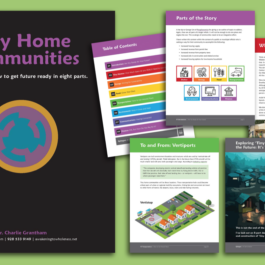What are the top 10 trends for the next ten years? Download the report here.

“Nothing can happen for decades, and then decades happen in weeks.”
- Scottish MP George Galloway
Act 1: The Before Times
Let’s accept that work has always been and will always be a team sport. It’s rare for a person to create saleable economic value on their own. Even “soloists” like social media influencers, superstar athletes, and Hollywood actors have agents, assistants, and teams.
Workplaces in the Before Times accommodated teams in central locations.
Your team was organized along an assembly line if you did manual labor, like assembling Harley Davidson motorcycles. If you were a knowledge worker, like a graphic designer or web programmer, your pre-covid workplace accommodated your teams in offices and cube farms that gave everyone a desk, chair, and an ever-shrinking island of personal workspace. Knowledge workers originally went to offices because their computer and phone networks were physically wired together. This is important to remember.
Around these workplaces that accommodated large groups of people, infrastructure arose to serve them:
Parking lots accommodated cars driven by employees who commuted from home to work.
Downtowns or central business districts offered places for workers to meet their daily needs: for coffee, breakfast, lunch, dry cleaning, and shoe shining, for drinks and meals after work.
Transit systems accommodated “rush hours” before and after shifts with commuter lanes and extra mass transit assets at “peak times.”
Both manual and knowledge workers were expected to work from their assigned places during their shifts. “Work” was a place and a set of activities, e.g., “I have to go to work.”
Then along came cloud computing, DNS, and wireless networks. This quietly created two categories of workers:
- place-dependent workers whose work could only be done in a specific location, like those Harley workers; and
- place-independent workers whose work required an internet connection and a computer. These workers could work remotely but mostly continued to commute to the office because that’s what everybody did.
But Gen Xers and Millennials with in-demand skills flipped the script. They first picked a place to live - a place that had the right mix of amenities - and then found a job or freelanced. I wrote a book about this, Live First, Work Second, and Richard Florida’s bestseller, The Rise of the Creative Class, gave community leaders a new focus: build the amenities that hipsters love, and the talent will come.
Act 2: The Disruption
Covid was an international shock to workplace norms. On a global scale, Covid proved that:
Remote work is possible; offices are optional or may be unneeded
Remote work works with tradeoffs
Place-dependent workers have less workplace flexibility than place-independent workers. This has caused rifts in some organizations that have place-dependent and place-independent workers
Place-independent workers have broad options for where to live and work; this is driving up their value to employers
Offering remote or hybrid work can help employers broaden their talent pools and attract and keep skilled and diverse talent
But everyone knows ^^that stuff.^^
Two more profound issues will shape long-term fundamental changes in our workplaces:
Workers faced their mortality during covid. What if our loved ones or we died? This caused a massive re-evaluation of how and where workers spend their time. Americans deprioritized work and reprioritized families, relationships, and their well-being. Beginning in April 2021, the Quits Rate in the U.S. passed four million people per month and didn’t let up for over a year. This was epic; the nation that invented workaholism said, “No more.” This will be a net positive for people, families, and society. And it will have long-tail impacts on workplaces.
Workers who could work from home did so at scale. A national experiment proved that remote work could be productive and fulfilling, enabling workers to have more time and balance in their lives.
Act 3: The Now Times
The lessons of covid won’t be unlearned or rewritten. A new contact is emerging between workers and their employers - one that recognizes workers' value and the tradeoffs employees are asked to make between work and their personal priorities.
These two forces - how people value their time and the national proof that remote and hybrid work can work - will fundamentally reshape the nature of work for years to come.
Some people ask, “When will it get back to normal?”
We won’t. We can’t go backward and move forward at the same time. It’s physically impossible.
What we can do - workers and employers - is accept that work is a team sport; question our former norms; and build intentionally for the cultures, customer values, processes, and, yes, offices that can work better for more people.
This blog is reprinted from article 1 of the Work Better series. Follow the Work Better Project and let us know how we can help you reimagine and redesign work that works better.
If you enjoyed this post, please subscribe to our newsletter.

Rebecca Ryan, APF
Rebecca Ryan captains the ship. Trained as a futurist and an economist, Rebecca helps clients see what's coming - as a keynote speaker, a Futures Lab facilitator, an author of books, blogs and articles, a client advisor, and the founder of Futurist Camp. Check out her blog or watch her Q&A on how NGC helps organizations prepare for the future using Strategic Foresight. Contact Lisa Loniello for more information.

Libby Castro
Libby Castro is an award-winning interior designer who is equal parts creative and compassionate. Libby believes that people impacted by a space should be brought into the decision-making process about their space. (That makes sense, right?) Libby and Rebecca share a “people first” ethic and co-created the Work Better project, to help rethink and redesign future workplaces.
Yasemin Arikan Promoted to Director of Futures Research
NEXT Generation Consulting (NGC) announced the promotion of Yasemin Arikan to Director of Futures Research. Arikan will lead the company’s efforts to...
Is Your Housing Market Ready for Your Future?
One of the biggest problems facing many cities and towns is inadequate housing. This problem is most acute for seniors, veterans with disabilities, and low-income groups ...
Three Things Martha Stewart Gets Right About Return to Office (RTO)
The original influencer and the person who invented the "Home" retail category, Martha Stewart, became the latest CEO to tell employees to get back to the office five day...







